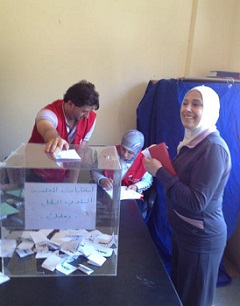Project
Underpinning and developing the democratic electoral processes in Azerbaijan
- Lebanon
- October 2014
The project was conducted by Center Women and Modern World (CWMW) in partnership with Baku Volunteer Center (BVC), and New Shamakhi Foundation (NSHF). The project was directed promote democratic values and mobilize women for participation in elections. I’s primary focus was on involving women in elections with journalists and local NGO heads as secondary beneficiaries. The project was carried out in 10 regions located close to Shamakhi, which is three hours’ drive outside the capital Baku.
English
Lessons from Project
💡
- Youth engagement
- Lebanon
- October 2014
While many of the young participants have gone on to create their own organizations to implement local initiatives, this may not be sustainable. Given the challenges for grassroots organizations to survive and the lack of local backing, it may be more effective to channel the energy and investment of youth into collective alternatives working with existing structures that are more likely to survive and have a longer lasting impact.
💡
- Youth engagement
- Lebanon
- October 2014
Since the project was designed to strengthen democratic processes, the workshops for the beneficiary groups should have provided more detailed information on rights. The project’s main priority was a needs-centered approach. What was absent was the perspective that access to public information, the monitoring of transparency in public administration, and good governance are the inherent rights of citizen that do not depend on the good will and acceptance of local authorities.
💡
- Youth engagement
- Lebanon
- October 2014
Working in the Municipality offices gave young participants an insider’s view of how the institution operates and a better understanding of its role. Similarly, Municipality officials said that their interaction with the Youth Shadow Councils had allowed them to see and appreciate the young people’s contribution, gradually leading them to view the young people as colleagues instead of interlopers.
💡
- Youth engagement
- Lebanon
- October 2014
The project involved a specific activity on how to conduct elections. This resulted in the democratic election of five Youth Shadow Councils which has boosted the culture of democracy among the citizenry and the beneficiary groups alike.
💡
- Youth engagement
- Lebanon
- October 2014
The project had a clear impact in building the capacity of youth in the areas of good governance, accountability, and transparency. Creating the Youth Shadow Councils had a very positive impact on the beneficiary populations in the Bekaa region, particularly because it promoted interaction among youth of different faiths and political persuasions. The young people consider the project to have been an initiation in social activism that enabled them to “do something together”.
💡
- Community activism
- Azerbaijan
- August 2010
Pairing with a more adversarial and higher-capacity NGO would have greatly leveraged project accomplishments and contributed to sustainability by better building capacity. No Memoranda of Understanding setting forth expectations and responsibilities were ever signed between the grantee and partners. The evaluators’ opinion is that these partnerships appear to have been based more on acquaintanceships and familiarity rather than strategic considerations. Neither partner organization had ever been involved in an elections project before.
💡
- Community activism
- Azerbaijan
- August 2010
Partnerships were not strategically designed; the two partnerships formed by the principal implementing agency appear to have been largely partnerships of convenience, lacking strategic direction and substantive content. The grantee has a strong comparative advantage as a locally-based NGO outside Baku specialized in women’s empowerment, but it needs to leverage that comparative advantage by forming partnerships with groups with greater capacity in democratization.
💡
- Community activism
- Azerbaijan
- August 2010
The grantee specialized in increasing the social participation of women in Azerbaijan. In this area, it had expertise, credibility, wide respect, and a strong network. It did not have these assets in elections and democratization. All of the planned outputs consisted of increasing the affiliation of women (and journalists) to the existing, flawed election system.
💡
- Community activism
- Azerbaijan
- August 2010
The major weakness of the project from a relevance point of view was that it bore no real relationship to needed governance reforms. The elections process in Azerbaijan is flawed. While increasing women’s participation in a flawed process is a valid goal, the project would have added more value if it had addressed basic issues in governance. While the project may have had some impact on women’s empowerment, it had none on democratization.
💡
- Community activism
- Azerbaijan
- August 2010
Training recipients interviewed expressed the view that they became more aware of and interested in politics as a result of trainings, and the grantee reports that several training participants became candidates. One trainee interviewed was motivated to become an election observer.
💡
- Community activism
- Azerbaijan
- August 2010
The decision to work in rural districts in Azerbaijan located reasonably close to Baku was a good one, as the needs for women’s empowerment outside the capital are greatest. Directly supporting a local NGO with no Baku base represented an innovative move
💡
- Community activism
- Azerbaijan
- August 2010
The project was relevant to the needs of Azerbaijan because (i) three elections were scheduled during the implementation period, (ii) voter participation has been low, particularly women’s participation, and (iii) especially in rural regions, women’s participation in social and political life is limited.
